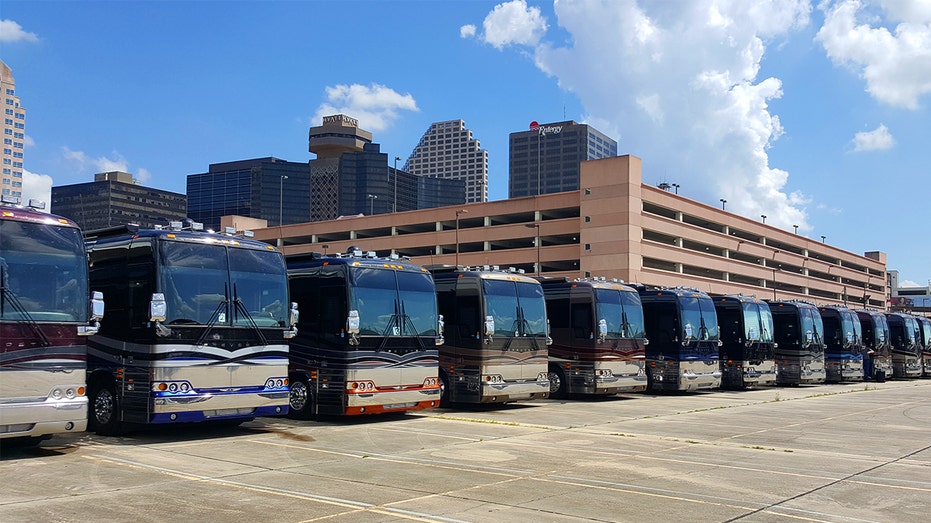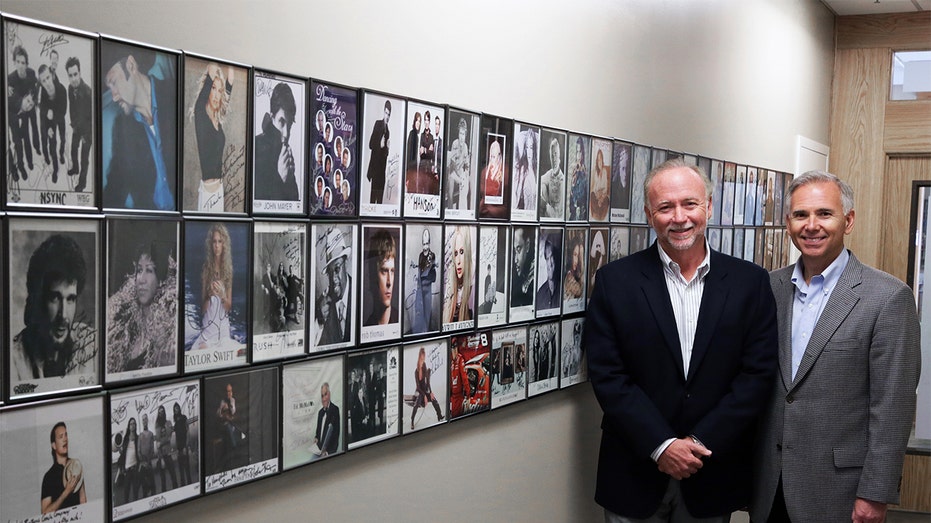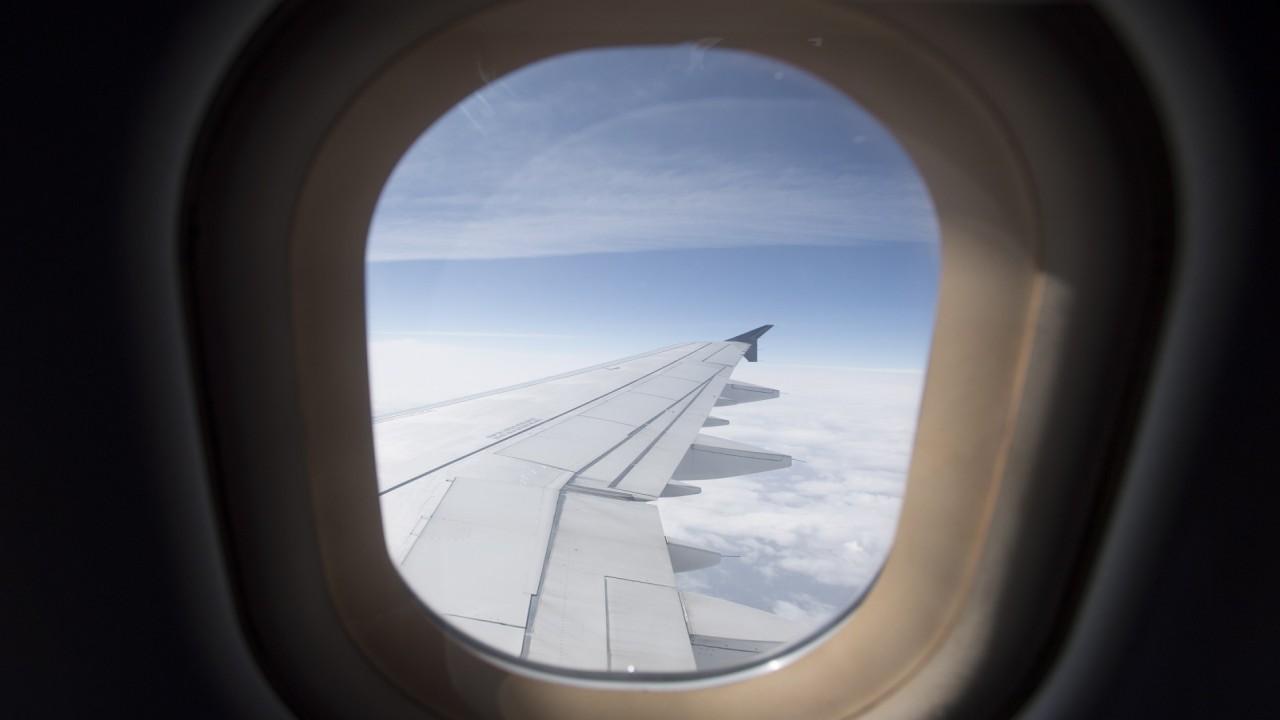Coronavirus brings tour bus industry to a halt, costing companies millions
$15B motor coach industry is at a standstill
It’s going to be a long road to recovery for the motorcoach and tour bus industry.
HOW TRAVEL COULD RECOVER, CHANGE AFTER CORONAVIRUS PANDEMIC: REPORT
Busses that transport entertainers, tourists, commuters, sports teams and students are spinning wheels and losing millions as employees remain unemployed despite nationwide reopenings following coronavirus shutdowns.

A fleet of motorcoach vehicles operated by the Hemphill Brothers. (Hemphill Brother)
Between 80 and 95 percent of motorcoach trips were canceled due to the coronavirus pandemic, a loss that amounts to a staggering $4.8 billion since mid-March when the virus broke out resulting in nearly 28,000 industry-wide job losses, according to new data commissioned by the American Bus Association, a trade organization for motorcoach operators and tour companies in the U.S. and Canada with economic research firm John Dunham and Associates.
AUTO LOANS AT LOWEST RATES SINCE 2013: EDMUNDS
“Now that the entertainers are not moving, our business is basically parked,”
Nashville-based Hemphill Brothers Coach Company, a family-owned business that’s been running since 1980, is one of the country’s largest tour bus providers to some of the biggest names in music like Beyonce, Cher and Paul McCartney. But with concerts canceled indefinitely since mid-March, brothers and co-owners Joe Hemphill and Trent Hemphill have had to furlough workers and consider pivoting their business to public rides after losing millions in revenue.

Trent Hemphill and Joe Hemphill, co-owners of Hemphill Brothers Coach Company in Nashville. (Bill Hobbs)
“Now that the entertainers are not moving, our business is basically parked,” Joe Hemphill told FOX Business on Friday.
Under normal circumstances, Hemphill Brothers transports 1,000 people per night, and some of their biggest clients pay $1,500 per day per bus with some stars renting nearly 20 buses at a time during a tour. Now, nearly all of the company's 150 drivers have been furloughed, with two or three drivers remaining on call. The company is running on just 5 percent of its normal revenue, and the business has lost $10 million since mid-March, he said
“For us, the touring, the concert industry, depends on large crowds and so do the artists with their big productions so we don’t know when we’ll be able to start back up,” Trent Hemphill said.
DRIVERS SPEED UP COMMUTES DURING CORONAVIRUS, DATA REVEALS
Hemphill Brothers is part of the $15 billion motorcoach industry, which provides service for 600 million passengers annually and employs about 112,000 drivers, mechanics and administrative staff, according to the American Bus Association.
The market is broken up into three segments: scheduled bus services, like Greyhound and Megabus that transport travelers across the country; private commuter busses that take riders to and from work; and the charter industry, like Hemphill Brothers that also comprises various tour bus companies. And when scheduled services resume, it is not likely to exceed 50 percent capacity due to social distancing.
But even as cities reopen, many offices and enterprises are running on limited capacity, and consumers are hesitant to use public transportation as the virus continues to spread.
CLICK HERE TO GET FOX BUSINESS ON THE GO
Many motorcoach enterprises command 70 percent of their annual income in the spring from March through June, in the middle of the pandemic-related closures, and with summer camps closed that’s another major chunk of lost business.
“Even though travel and hospitality are starting to open up, this segment of the industry will not open up nearly at the same pace -- we’re looking at a three- or four-year recovery,” Peter Pantuso, president and CEO of the American Bus Association said, noting capacity restrictions will inevitably result in rate cuts. “If you can only put 25 people on a 50 passenger bus, you cannot run a bus at the same rate for very long.”
“People forget about us because we blend into the background and we don’t come to Congress every year looking for a handout. Now we really need some help,”
The motorcoach and tour bus industry was left out of the CARES Act that Congress enacted, however, some private, nonprofit organizations were able to collect funding from The Economic Injury Disaster Loan Program’s $2 million fund or the Paycheck Protection Program from the Small Business Association.
“People forget about us because we blend into the background and we don’t come to Congress every year looking for a handout. Now we really need some help,” Pantuso said.
CLICK HERE TO READ MORE ON FOX BUSINESS




















